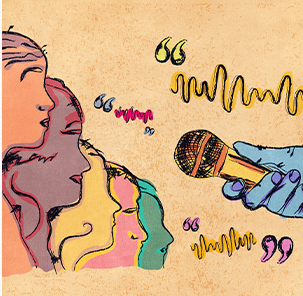Subscribe and receive the best Inkyfada podcasts straight to your mailbox.
Don't miss out! Subscribe to our newsletter to receive the latest Inkyfada podcasts.
Thanks for your inscription
Unsubscribe at any time

When Muawia Ibn Abu Sufyan died in 60H/670 AD, the Arab caliphate was destabilized. While his son Yazid succeeded in killing Al-Hussein Ibn Ali in 61H, the Prophet's grandson, he not only fueled Shiite fury but also faced a challenge to Umayyad power from another Qurayshi aristocrat (grandson of the first caliph, Abu-Bakr, and related to the Prophet).
Abdallah Ibn Zubeyr proclaimed himself caliph in the same year and, after the death of Yazid and his son Muawya II, initiated the Second Discord, which lasted for ten years. This war had repercussions on the western front. However, the sources that tell us about Oqba's second term in Ifriqiya barely mention it. Nevertheless, they are rich in accounts of Oqba's vendetta against Abu Al-Muhajir, his deadly hostility with Kacîla of the Awrba Berber tribe, and his legendary conquests as far as the Atlantic.
Kacila ruled in Kairouan for five years before the Arabs recaptured it from him in 67H/687 AD. But in 73H/693 AD, the Umayyad caliph Abd Al-Malik emerged victorious from the Second Discord and began implementing his imperial project. He sent the Ghassanid leader Hassen Ibn Noomen to Ifriqiya with an army of 40,000 men to occupy it fully and take Carthage.
We are pleased to have as our guests, Mr. Fathi Bahri, historian and archaeologist specializing in the Middle Ages, former director general of the INP, Mr. Mohamed Ben Abbes, historian specializing in Late Antiquity and Early Middle Ages, Mr. Mohamed Hasan, historian specializing in the Middle Ages, Mr. Faouzi Mahfoudh, archaeologist and historian specializing in Islamic art and architecture and former General Director of the INP (National Heritage Institute) and Mr. Taher Ghalia, historian and archaeologist specialized in architecture and mosaics of Late Antiquity.
*The podcast director extends his sincere thanks to the honorable professors Adnan El Ghali and Nouri Boukhchim.
Inkyfada Podcast is the first platform entirely dedicated to original Tunisian podcasts, and was conceived by Inkyfada media in collaboration with the in-house research and development laboratory, InkyLab. Inkyfada joined the global podcast boom in 2017, when the team produced the first Tunisian audio documentary, diving deep into the belly of the El Kamour struggle taking place in the desert. Since then, Inkyfada Podcast has produced a wide variety of documentaries, investigations, and podcast series, as well as articles accompanied by music; covering a multitude of contemporary issues in order to offer an immersive and alternative podcast experience. Whilst exclusively offering audio content, the Inkyfada Podcast team upholds the same core values and principles of inkyfada.com, and is committed to producing high quality content though a dynamic and meticulous production process. In addition to the permanent team, Inkyfada podcast works closely with various journalists, artists, illustrators, musicians and other content creators in order to diversify the platform and support artistic creativity. These podcasts differ from traditional radiophonic content in that the applied production and editing process is more akin to cinematographic techniques, in addition to being web-based, downloadable and accessible on demand. Additionally, Inkyfada Podcast uniquely offers subtitles in French, Arabic and English for all audio content, the majority of which is recorded in Tunisian or in the preferred language of the speaker in question.